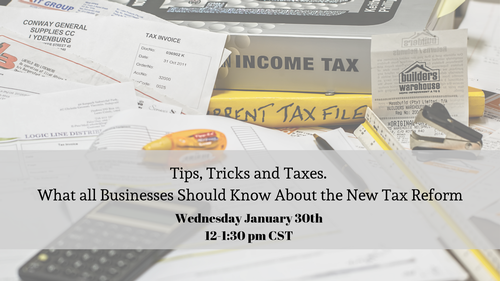Tax reform explained: What your business needs to know
Jan. 19, 2018
This piece is presented by Cain Ellsworth & Company LLP
If you’re still figuring out what recent federal tax reform means to your business, you’re far from alone.
Mikal Claar, a taxation partner at Cain Ellsworth, is also an attorney. He put on both hats to answer questions many business owners are asking as they work through the changing tax landscape.
What are common questions you’re getting about tax reform?
Right now, the big question is: Is it going to benefit me? The general answer is it likely will. I think the tax benefit will be broad-based, whether you’re an individual or business taxpayer. The headlines have been made with the 21 percent corporate tax rate, and there are a lot of dollars tied to that. For small businesses taxed under individual tax rates, there’s a new 20 percent deduction of business income across the rate spectrum. Virtually every individual rate bracket has been cut 2, 3, 4 percent, and in some cases the brackets are broadened.
Many businesses are considering changing from S to C corporations. What’s your advice?
The short answer is you need to take some time and study it. Particularly at lower income levels, with the new 20 percent deduction available to small businesses not operating as C corp, you’ll find your effective tax rate is less than 21 percent. For a taxpayer who is married with $315,000 or less of taxable income, the marginal rate is 24 percent, and if you reduce it by 20 percent, the effective tax rate is 19.6. There are a lot of businesses that presume they maybe should convert to C, but when they sit down and run the numbers, I think they will find that may not be advisable. Every small business should sit down with their accountant and talk about what form of operation to best use under tax reform.
Would it ever make sense to change from a C to an S?
Yes, and we’ve already seen that with some clients. For example, embedded in the legislation is a provision co-sponsored by Sen. John Thune and Sen. John Hoeven that is very lucrative to agriculture. If I’m a grain producer and sell inventory to my local grain co-op, I get a deduction equivalent to 20 percent of the gross sales price. That may exceed my taxable income on that grain. If I’m a C corp farmer, I don’t get that.
What else should people keep in mind when assessing their entity structure?
I think it’s really important when people make decisions in changing entity structure to remember this tax law sunsets in seven years. If you revoke an S election, you can’t make another one for four years. So technically this is temporary, and when you make long-term decisions, you need to bear that in mind. You also lock yourself into double tax if you pay dividends or liquidate as a C corp.
What’s changed as far as allowable deductions for businesses?
The biggest change touted is the immediate write-off of fixed asset purchases other than buildings. This is one piece of legislation that’s retroactive. For purchases of property placed in service after Sept. 27, 2017, 100 percent bonus depreciation can apply to new and used assets. Literally, it applies to any asset with a 20-year-or-less recovery period, which essentially excludes only buildings, so the business community can take immediate write-off of tangible personal property. It’s going to be a rare case to find a business without the ability to write off their purchases in the year they’re placed in service.
What do people need to keep in mind about the estate tax?
A lot of people have gotten complacent in terms of planning their estates. A married couple can each protect $11 million in assets, and 99 percent don’t have that, so people think they aren’t close to that and don’t need to be concerned about estate planning. But there are a lot of other issues involved in good estate planning. You want to make sure you create equity within the family and minimize the potential for conflict among the kids. Get a plan on the table, and talk about it. The biggest single benefit in the law, in my mind, is when someone dies, most of their assets are revalued to date-of-death value, and the family can turn around and sell the asset free of capital gain tax. So there’s a lot of planning that can still be done to save significant income taxes from an estate perspective. The estate tax exemption doubling took most of America off the map as far as worrying about paying estate tax. But there’s still the capital gains issue where a lot of money can be saved.
So should people have confidence these changes are here to stay?
All this tax law, but for the 21 percent C corp rate, sunsets in eight years. So if Congress hasn’t done something to continue the tax cuts, we restore the law as it was at the end of 2017. Rates go up. Personal exemptions come back. The estate tax exemption is restored to its 2017 level, and people may have made significant adjustments in their estate planning based on the law as reformed. The troubling part for me is federally we still have a significant budget deficit, so where does the revenue come from to continue this in the future? So I have some concerns, and that’s why it’s key that businesses work with their team of advisers, including a CPA who understands these changes, to develop the best long-term plan for them.
To get your accounting, taxes and bookkeeping back on track without stress and anxiety, or for a free consultation, give Cain Ellsworth’s Stacie Dykstra a call at 605-610-4611 or email her at [email protected].








